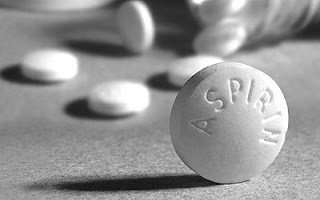HEALTH
Aspirin, Not For Primary Prevention of disease
Good old aspirin, good at times
Aspirin is of uncertain net value in primary prevention of vascular disease, says a new study published in The Lancet. However, low-dose aspirin is of definite and substantial net benefit for many people who already have occlusive vascular disease. In other words, aspirin is enormously useful as a prophylactic (preventive) for cardiovascular events, including myocardial
 infarction (MI, i.e. a heart attack) and ischaemic stroke (blockage of artery leading to death of brain tissues).
infarction (MI, i.e. a heart attack) and ischaemic stroke (blockage of artery leading to death of brain tissues).There has been concern, however, that aspirin can increase haemorrhagic strokes and cause gastrointestinal bleeding. Hence the study, which was funded by the UK Medical Research Council, British Heart Foundation, Cancer Research UK, and the European Community Biomed programme.
Antioxidant in melon relieves stress
London : A dietary ingredient derived from a melon, rich in an antioxidant, has been shown to relieve stress. Researchers found that the supplement cut down the signs and symptoms of perceived stress and fatigue in healthy volunteers.
Marie-Anne Milesi from Seppic, France, worked with a team of researchers to evaluate its anti-stress effects in 70 volunteers . "We wanted to test whether augmenting the body’s ability to deal with oxidative species might help a person’s ability to resist burnout," informs Milesi.
. "We wanted to test whether augmenting the body’s ability to deal with oxidative species might help a person’s ability to resist burnout," informs Milesi.
"The 35 people in our study who received capsules containing superoxide dismutase (melon derivative) showed improvement in several signs and symptoms of perceived stress and fatigue," The researchers found a strong placebo effect in the volunteers who received inactive starch capsules, as can be expected when studying subjective feelings like stress. However the improvements seen in the supplement group were significantly greater, especially after 28 days, according to a release of Bio Med Central.
"The placebo effect was only present during the first seven days of supplementation and not beyond," said Milesi.
"It will be interesting to confirm these effects and better understand the action of antioxidants on stress in further studies with a larger number of volunteers and a longer duration," she added.
London : A dietary ingredient derived from a melon, rich in an antioxidant, has been shown to relieve stress. Researchers found that the supplement cut down the signs and symptoms of perceived stress and fatigue in healthy volunteers.
Marie-Anne Milesi from Seppic, France, worked with a team of researchers to evaluate its anti-stress effects in 70 volunteers
 . "We wanted to test whether augmenting the body’s ability to deal with oxidative species might help a person’s ability to resist burnout," informs Milesi.
. "We wanted to test whether augmenting the body’s ability to deal with oxidative species might help a person’s ability to resist burnout," informs Milesi."The 35 people in our study who received capsules containing superoxide dismutase (melon derivative) showed improvement in several signs and symptoms of perceived stress and fatigue," The researchers found a strong placebo effect in the volunteers who received inactive starch capsules, as can be expected when studying subjective feelings like stress. However the improvements seen in the supplement group were significantly greater, especially after 28 days, according to a release of Bio Med Central.
"The placebo effect was only present during the first seven days of supplementation and not beyond," said Milesi.
"It will be interesting to confirm these effects and better understand the action of antioxidants on stress in further studies with a larger number of volunteers and a longer duration," she added.
Comments